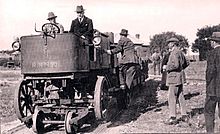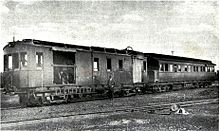1923 in South Africa
| |||||
| Decades: | |||||
|---|---|---|---|---|---|
| See also: | |||||
The following lists events that happened during 1923 in South Africa.
Incumbents
- Monarch: King George V.
- Governor-General and High Commissioner for Southern Africa:
- Prince Arthur of Connaught (until 5 December).[1]
- Sir James Rose Innes (acting, from 5 December).
- Prime Minister: Jan Smuts.
- Chief Justice: Sir James Rose Innes.
Events
- March
- 1 – The Electricity Supply Commission (Eskom), largest electricity producer in Africa, is established.
- Unknown date
- The South African Native National Congress changes its name to African National Congress.
Births
- 10 April – John Watkins, cricketer (d. 2021)
- 30 April – Francis Tucker, rally Driver. (d. 2008)
- 19 May – Johannes Meintjes, artist and writer. (d. 1980)
- 6 August – Moira Lister, South African-born English film, stage and television actress. (d. 2007)
- 5 October – Glynis Johns, South African-born Welsh actress. (d. 2024)
- 11 October – Moses Mabhida, anti-apartheid activist. (d. 1986)
- 11 November – Pieter van der Byl, politician (d. 1999)
- 20 November – Nadine Gordimer, writer and political activist. (d. 2014)
- 17 December – Wilton Mkwayi, anti-apartheid activist. (d. 2004)
Deaths
- 10 October – Herman Gottfried Breijer, Dutch-born South African naturalist
Railways



Railway lines opened
- 12 April – Transvaal – Dunswart to Apex deviation, 4 miles 16 chains (6.8 kilometres).[2]
- 21 May – Natal – Queen's Bridge to Duff's Road deviation, 5 miles 55 chains (9.2 kilometres).[2]
- 8 July – Natal – Canelands, Umdloti to Maidstone deviation, 6 miles 74 chains (11.1 kilometres).[2]
- 6 August – Cape – Kamfersdam to Winter's Rush, 34 miles 29 chains (55.3 kilometres).[2]
- 9 August – Cape – Belmont to Douglas, 53 miles 22 chains (85.7 kilometres).[2]
- 30 October – Transvaal – Settlers to Tuinplaas, 13 miles 22 chains (21.4 kilometres).[2]
Locomotives
- The New Cape Central Railway places two 2-6-2+2-6-2 Double Prairie type Garratt articulated steam locomotives in service. They will be designated Class GK on the South African Railways (SAR) in 1925.[3][4][5]
- Major Frank Dutton, SAR Signal Engineer and the Motor Transport Superintendent, conducts trials with a prototype petrol-paraffin powered Dutton road-rail tractor.[5][6]
- Mr. C. Lawson, Superintendent Mechanical of the SAR, experiments with gas-electric motive power and constructs a single experimental producer gas-electric locomotive. The locomotive remains in service for several years but the gas-electric concept will eventually be superseded by diesel-electric traction.[5][6][7]
References
- ^ Archontology.org: A Guide for Study of Historical Offices: South Africa: Governors-General: 1910-1961 (Accessed on 14 April 2017)
- ^ a b c d e f Statement Showing, in Chronological Order, the Date of Opening and the Mileage of Each Section of Railway, Statement No. 19, p. 188, ref. no. 200954-13
- ^ Holland, D.F. (1971). Steam Locomotives of the South African Railways. Vol. 1: 1859–1910 (1st ed.). Newton Abbott, England: David & Charles. pp. 79–80. ISBN 978-0-7153-5382-0.
- ^ Hamilton, Gavin N., The Garratt Locomotive - Garratt Locomotives produced by Beyer, Peacock, retrieved 10 November 2012
- ^ a b c Paxton, Leith; Bourne, David (1985). Locomotives of the South African Railways (1st ed.). Cape Town: Struik. pp. 93–94, 118–119. ISBN 0869772112.
- ^ a b Espitalier, T.J.; Day, W.A.J. (1945). The Locomotive in South Africa - A Brief History of Railway Development. Chapter VII - South African Railways (Continued). South African Railways and Harbours Magazine, October 1945. pp. 782-783.
- ^ Heymans, Brig. H.B.; Parsley, Dr. G.M.J. (2000).The SAR Experimental Suction Gas-Electric Locomotive. Paper dated 28 September 2000.

